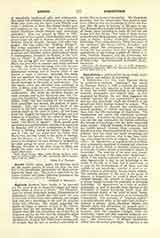

Agnoetae (Greek: agnoetai from agnoeo, to be ignorant of), the name given to those who denied the omniscience either of God or of Christ. The Theophronians, so named from their leader, Theophronius of Cappadocia (370), denied that God knew the past by memory or the future with certainty; and taught that even for a knowledge of the past He required study and reflection. The Arians, regarding the nature of Christ as inferior to that of His Father, claimed that He was ignorant of many things, as appears from His own statements about the day of judgment and by the fact that He frequently asked questions of His companions and of the Jews. The Apollinarists, denying that Christ had a human soul, or, at least, that He had an intellect, necessarily regarded Him as devoid of knowledge. The Nestorians generally, and the Adoptionists who renewed their error, believed that the knowledge of Christ was limited; that He grew in learning as He grew in age. The Monophysites logically believed that Christ knew all things, since, according to them, He had but one nature and that divine. But some of them, known as the Severian Monophysites, set limits to the knowledge of Christ. Luther attributed extraordinary knowledge, if not omniscience, to Christ, but many of the reformers, like Bucer, Calvin, Zwinglius, and others, denied His omniscience. Some Catholics during the last century have also questioned the omniscience of the human intellect of Christ, e.g. Klee, Gunther, Bougaud, and the controversy has again aroused some interest owing to the speculations of Abbe Loisy. See Knowledge of Jesus Christ; Monophysites and Monophysitism.

